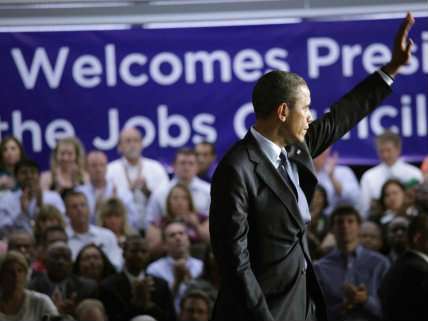Government Policies Made the Economy Worse - and They're Still Impeding the Recovery

Why has the U.S. job market stayed so lousy for so long? The impact of the recession explains part of it, but it's not the whole story, according to a paper unveiled Friday by economists Steven J. Davis and John Haltiwanger. Davis, of the University of Chicago, and Haltiwanger, of the University of Maryland, looked at employment trends across the country in recent years and concluded that a significant chunk of the problem predated the economic downturn.
The issue is a reduction in labor market fluidity. Essentially, older people are staying put in the jobs they have, creating less turnover and less movement. So one of the consequences is that younger people are having trouble getting their foot in the door.
That has ripple effects for years to come. The longer it takes for someone to get his or her first job, and the lower-paying that initial job is, the harder it is to gain skills and connections that allow someone to move up the ladder. Basically, the part of the labor market that already has work (older workers) is less fluid. As a result, there are fewer opportunities for the part of the labor market that doesn't have work (younger people who want to work). They can't get jobs, can't accumulate "human capital"—everything from concrete skills to personal connections to a conceptual understanding of how their markets function—and so have a harder time getting started. It's a vicious cycle. Younger workers and men, the economists say, are hit the hardest.
Part of what makes Davis and Haltiwanger's conclusion so interesting is that in many ways it contradicts the conventional wisdom that economy has become to unsteady, too uncertain, and too volatile. What they're saying, in contrast, is that the economy isn't volatile enough.
Why is the economy more rigid than it used to be? The economists have a few ideas, as noted in a New York Times write-up of the paper:
Mr. Davis and Mr. Haltiwanger attribute some of this decline to the aging of the work force; as people get older, they tend to change jobs less frequently. The decline in the creation of new companies is also playing a role. In effect, companies are getting older, too. This has been particularly pronounced in the retail sector, where giants like Walmart and McDonald's offer relatively stable employment.
The paper argues that economic policy also plays an important role. The cost of training workers has increased, partly because the share of all workers who require government licenses has grown by one estimate from about 5 percent in the 1950s to 29 percent in 2008. This discourages hiring. So do legal changes that have made it more difficult to fire employees, the paper says. It also mentions health insurance as a reason that employees may stay put.
In other words, policy makes a difference, especially when the marginal effects are allowed to build up over time and gum up the works. Licensing and training requirements make it more expensive to put people to work. Policies that make it harder to fire inevitably make it harder to hire too. And our half-century old policy of tying health insurance to employment through favorable tax treatment has likely made it harder, at the margins, for workers to move from job to job.
Part of this, then, is a story about how the government got in the way. As time went on, the cumulative effects of multiple bad employment policies helped make for a bad job market. And recovery could be harder and longer than we think, because even after the effects of the recession wear off, those problematic policies will still be dragging us down.


Show Comments (13)